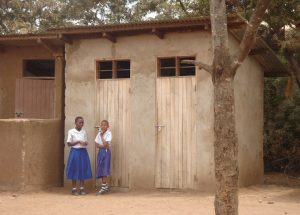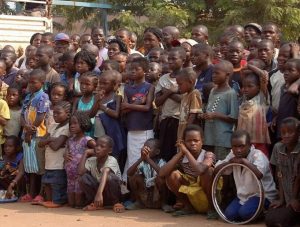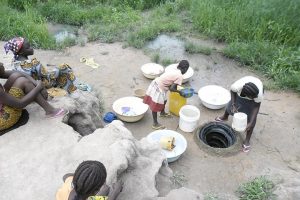
Winner of the Best local/domestic NFP case study of our Making a Difference Competition. This project was carried out by Forcier Consulting on behalf of Catholic Relief Services D.R. Congo.
“This very important piece of research is something that could make a real difference to half the population.”
Every month girls face an additional barrier to education: their period. For Forcier, studying the relationship between menstruation and education means more than just attempting to understand absenteeism. Our goal was to provide strong field-based evidence to NGOs, the DRC government and all actors in the health and sanitation field. We believe that good research must go far beyond simple statistics, which is why we always chose to adopt a holistic approach to data collection and analysis, which in this case includes extensive research surrounding community attitudes, beliefs, and hard to see implications. In 2017, Catholic Relief Services selected Forcier to accomplish one of the largest studies on knowledge, attitudes, environment, and practices regarding menstruation in the Democratic Republic of the Congo (DRC). The overall objective was to determine whether menstrual management practices have an impact on school absenteeism for girls, and to evaluate how the Congolese government’s “Healthy Schools and Villages” program, supported by UNICEF, can contribute in improving menstrual hygiene management. Data was collected by local Forcier enumerators in the provinces of Kinshasa and Haut-Katanga, as well as in camps for internally displaced persons in North-Kivu, thereby allowing for an analysis in urban, rural, and emergency contexts. In the province of Kinshasa and Haut-Katanga, both respondents living in areas impacted by the “Healthy Villages and Schools” program and respondents not living in these areas were interviewed, and, in all three provinces, both girls in school and out of school were interviewed. The results of this study will help NGOs, the Congolese government and UNICEF adapt their interventions so as to better respond to the menstrual hygiene needs of girls and women in the country.
Forcier put forth a holistically designed mixed-methods approach for this research. In order to garner a broad understanding of the different barriers menstrual hygiene can represent for women, it was essential to collect information from the various groups of people who can influence how girls and women manage their menses. Forcier conducted 2601 quantitative surveys with 10 to 17 year old girls and their female guardians and 1022 quantitative surveys conducted with 10 to 17 year old boys. Forcier in addition, uses qualitative interviews to obtain contextual details and experiences of people with opinions that can shed light on hard to see implications. Qualitative interviews were conducted through the use of focus group discussions. 60 Focus Group discussions were conducted with girls, fathers of girls, teachers, community leaders and health practitioners. To ask questions to 10 to 15 year old girls in camps for displaced persons, an especially vulnerable population, child psychiatrists used dice game to make them more comfortable discussing these issues and to overcome taboos about menses. Analysis was conducted by triangulating the quantitative and qualitative data collected, as well as information garnered through a thorough literature review. The research was designed to allow for findings to be presented for the individual provinces in which data was collected as well as the country as a whole.

The research, made up of 3623 quantitative interviews and 60 Focus Groups, identified the main obstacles preventing girls in the DRC from meeting their menstrual hygiene needs. Girls are unable to adequately manage their menstrual hygiene because of a lack of sufficient knowledge and understanding of menstruation in the country. Whether village leaders, educators, parents, or the girls themselves, many members of Congolese society are not properly informed on the causes of the menstrual cycle nor, critically, how to teach girls to manage their menses in a safe, private, and healthy manner. This is largely the result of a substantial taboo that surrounds menstruation, in part consequence of a conservative social order that associates the menstrual cycle with girls’ sexuality, and which impedes open discussion with girls both before, during, and after menstruation first begins. Additionally, poor infrastructure, especially in villages and schools – in particular, a lack of clean, girls-only and private bathrooms – prevents girls from adequately taking care of themselves when they have their menses. A lack of available and affordable tampons or sanitary napkins further complicates girls’ ability to ensure their menstrual hygiene, and adds to their fear of being seen in public at these times. As a result, girls often stay at home when they have their menses – sometimes days at a time – forgoing their usual activities, including sports, church, and, most crucially, school, for fear of being “discovered” and “shamed” by members of their community.

The findings of this study are vital because they will allow Catholic Relief Services and other organizations working on hygiene, education and gender issues to better tackle the specific challenges that girls face in living in a healthy way and in receiving an education. Indeed, this research on menstrual hygiene management is one of the first of its kind, on a too often overlooked aspect of development that is crucial to understand for the sake of empowering women. In particular, this research will help the Congolese government, along with UNICEF, reinforce the “Healthy Villages and Schools” program that seeks to improve sanitary and hygienic conditions in thousands of villages and schools across the country, including in camps for internally displaced persons, by highlighting the need to raise awareness on menstrual hygiene, improve infrastructure and make available sanitary napkins. This will, in turn, allow girls to live more comfortable, healthy lives and live up to their true potential.
About the Author:

